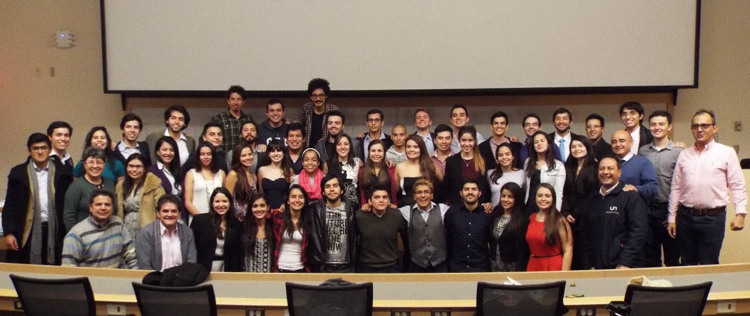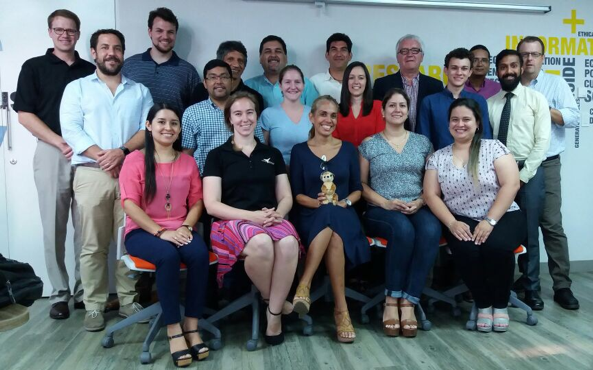

For the last seven years, the Colombia-Purdue Initiative (CPI) has connected faculty, staff, students, and alumni from Purdue and Colombian institutions to work together on numerous projects. One of their main goals is to propel and improve the instruction and learning of science, technology, engineering, and mathematics (STEM) in Colombia. Here we describe some of these projects, presented this year at two prestigious Engineering Education events: The American Society for Engineering Education's (ASEE) annual conference and the Research in Engineering Education Symposium (REES).
A project that started with a social worker, a Purdue professor, and 14 middle and high school students from low-income neighborhoods in Medellín has become one of the most inspiring and life-changing initiatives between Colombia and Purdue. Although Proyecto Interchange was initially intended to bring science to a small group of students, it has impacted more than 1,000 children. The first stage of the project was developed in Medellín, where the students were exposed to and engaged with science through video-conferences, workshops, and science competitions. For the second stage, a group of outstanding students is selected each year and invited to attend the Gifted Educational Research Institute (GERI) Camp at Purdue. The goal is to motivate these young students to pursue STEM career paths by strengthening knowledge bases, bringing them closer to the different fields and applications, and involving them with young role models that they can relate to.

Event for Interchange students in 2015 hosted by Carol Handwerker, one of the co-founders of the program.
Project leaders:
Alejandro Roldán - Professional in Organizational Innovation, Ruta N
Carol Handewerker - Reinhardt Schuhmann Jr. Professor of Materials Engineering, Purdue University
Carolyn Percifield - Director of Strategic Planning and Assessment, Purdue University
The Undergraduate Research Experience Purdue-Colombia (UREP-C) is a student-exchange program between Universidad Nacional (UNAL) de Colombia and Purdue University. In 2013, the program was designed to bring senior undergraduate students to a six-month research internship, strengthening research in Colombia with an international focus. A group of students is first selected based on their outstanding academic performance and English skills and then paired with Purdue faculty based on shared research interests. The 2013 pilot brought four students from UNAL-Bogotá. After obtaining excellent results, the program grew to bring groups of 25, 49, 20, and 30 students every year since 2014, reaching eight UNAL campuses and all Purdue colleges. This program inspires students to pursue their academic dreams and gives them the tools to work on those goals. From the 124 students that have participated in the UREP-C program, 14 students have come back to Purdue to enroll in graduate programs!

UREP-C Students, Cohort 2015
Project leaders:
Nancy Rozo - Director, International Relations, Universidad Nacional de Colombia Sede Bogotá
Juan Diego Velásquez - Managing Director of Strategic Initiatives, College of Engineering, Purdue University
Universidad EAFIT, Universidad del Norte (UniNorte), and Purdue University have worked hard to increase student mobility between Purdue and Colombia and to prepare students to be competitive in the 21st Century workforce. Thanks to a 100,000 Strong in the Americas Innovation Fund grant won by EAFIT in 2015 and a subsequent grant from the same program won by the three institutions in 2016, 43 students have been able to participate in study abroad programs ranging from two weeks to one semester in length. Purdue's Global Engineering Programs (GEP) continues to secure funding in order to grow and develop these programs. They recently won a $12,000 Study Abroad Intercultural Learning (SAIL) and Intercultural Pedagogy Grant for their summer program in Colombia. This program is expected to bring at least 20 additional Purdue engineering students to visit both EAFIT and UniNorte. All of these grants have solidified the strategic partnerships among the three universities. The goal is to continue to support student development and reduce the barriers to study abroad in Colombia.

From left to right: Marcela Wolff López (Universidad Eafit), Arvind Raman (Purdue), Neal R. Goins (Exxon Mobil), Jeannie Helen Caicedo Torres (UniNorte)
Project leaders:
Marcela Wolff López - Director, International Relations, Universidad EAFIT
Jeannie Helen Caicedo Torres - Director, International Cooperation and Development, Universidad del Norte
Heidi E. Parker - Assistant Director, Latin America/Spain Program, Global Engineering Programs, Purdue University
In 2016, engineering faculty and undergraduate students from Purdue University and Universidad de Cartagena built and installed two slow-sand filters to provide clean water to a school with 400 kids. The school is located in San José de Playón, Bolívar, a town in which development was truncated by the armed conflict in Colombia.
The filters have provided clean water for eight months after their installation, validating Purdue's technology in the area's conditions: A tropical weather and particular sand characteristics. The technology-transfer project has expanded to a school in Isla Barú, to a Zenú indigenous community in Bolívar, and to low-income areas in Medellín and Bogotá. Besides bringing clean water to the region, the project provided an intercultural experience for university students, trained school teachers, and community leaders. It also inspired the kids to pursue second language, undergraduate, or graduate studies. Here is a video in Spanish about the project.

Faculty and students from Purdue and Universidad de Cartagena with children benefitted by the initiative. In the background, in black, from left: Edgar Quiñones (Universidad de Cartagena) and Chad Jafvert (Purdue). In the foreground, from left: Wendy García, Sanyukta Gokhale, Hernán Pájaro, María José Rivas, Sol Park, and Kaylyn Colinco.
Project leaders:
Edgar Quiñones-Bolaños, Professor, Civil Engineering, Universidad de Cartagena
Chad Jafvert, Professor, Environmental & Ecological Engineering, Lyles School of Civil Engineering, Purdue University
John Howarter from Purdue, Professor, Environmental & Ecological Engineering, School of Materials Engineering, Purdue University
With the goal of increasing engineering retention in core disciplinary classes, faculty from mechanical engineering designed in 2009 the Freeform Classroom. The methodology combines a textbook and lecture notebook, hundreds of instructor-produced videos, demonstrations of mechanics concepts and phenomenon, conceptual-based case study analyses, and interactive simulations. A more recent collaboration with engineering education resulted in substantial NSF funding for the project, which is a key component of the new Mechanical Engineering Education Research Center at Purdue (MEERCat Purdue).
After showing remarkable success in supporting improved student outcomes in different institutions in the United States, Freeform researchers established a collaboration with educators at Universidad del Norte in Colombia. Freeform was used for a course on solid mechanics, which reduced the rate of students achieving D's, F's, or withdrawing from the course from 60 percent to 37 percent and evolved course pedagogy from a teacher-centered methodology to a more student-centered approach.

Faculty from Universidad del Norte and Purdue University participating in a Freeform Classroom workshop in Barranquilla.
Project leaders:
Chuck Krousgrill, Professor, School of Mechanical Engineering, Purdue University
Jennifer DeBoer, Assistant professor, Engineering Education, Purdue University
Jorge Bris, Associate Professor, Department of Mechanical Engineering, Universidad del Norte
Atarraya was co-founded and is co-led by Purdue alumna Mariana Tafur Arciniegas. It was launched with a networking event during the REES 2017 Conference, held this year in Bogota.

Atarraya was launched with a networking event during the REES 2017 Conference, July 5th 2017
Project leader:
Mariana Tafur Arciniegas, Assistant Professor. Coordinator of Research in STEM Education and Atarraya-STEM, School of Education, Universidad de Los Andes
For the last two summers, a Purdue postdoctorate researcher and two PhD students delivered workshops for more than 60 engineering faculty fromthree Colombian institutions: Universidad del Magdalena, Universidad Eafit, and Universidad Nacional - Bogotá. The workshops aimed at providing faculty with tools for the effective design of engineering instruction - from learning objectives to assessment and teaching strategies. A paper based on their first experience (June 2016, EAFIT) was presented at REES 2017 and drew the attention of representatives from various institutions in Colombia. Trying to maximize the impact of their project, they have established preliminary contact with officers from both ACOFI and ASEE to find community building strategies.

From left to right: Juan David Ortega Álvarez (Purdue), Matilde Sánchez Peña (Purdue), Camilo Vieira Mejía (Purdue), Roberto Aguas (UniMagdalena)
Project leader:
Camilo Vieira Mejía, Postdoc in Computer Graphics Technology and Computer Information Technology, Purdue University
Juan David Ortega Álvarez, PhD student in Engineering Education, Purdue University
Matilde Sánchez Peña, PhD candidate in Engineering Education, Purdue University
Last modified: December 4, 2023